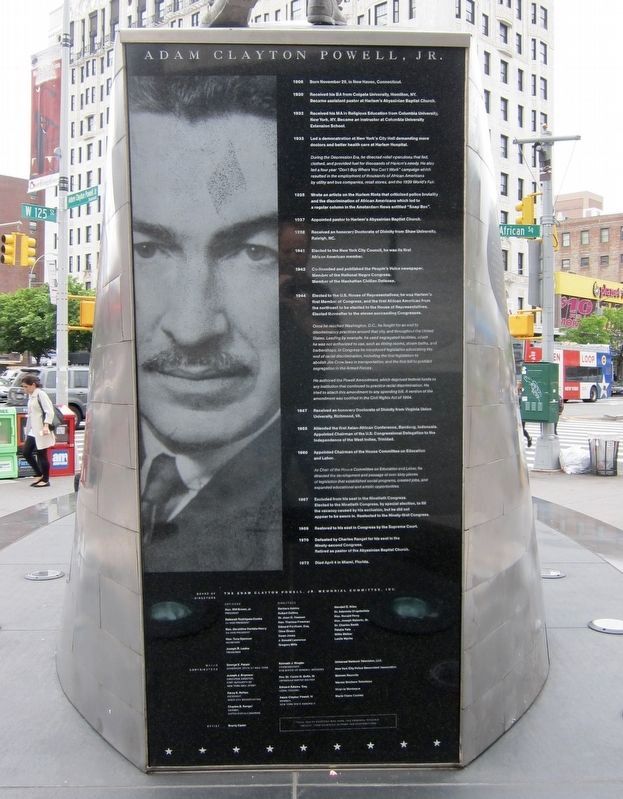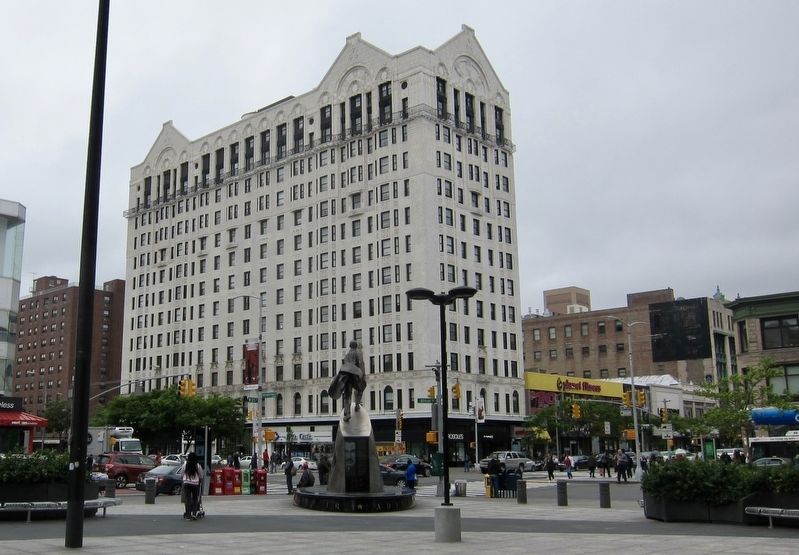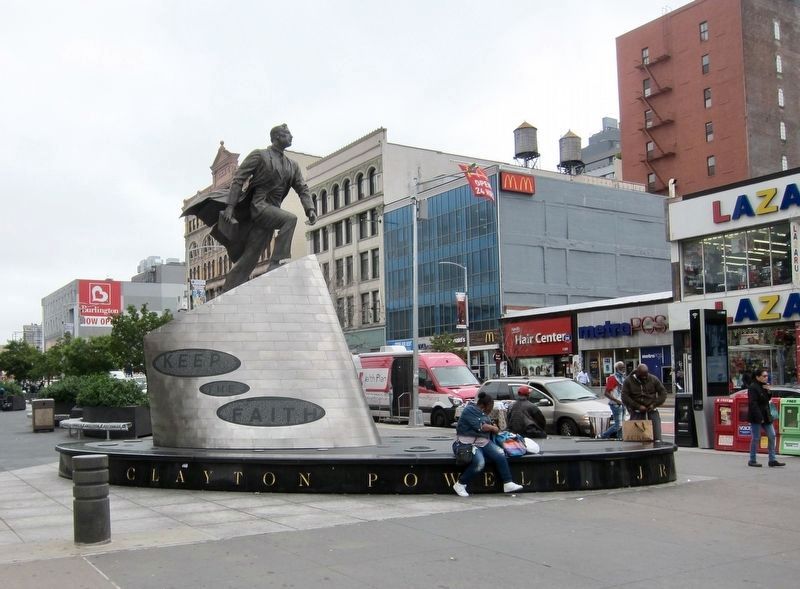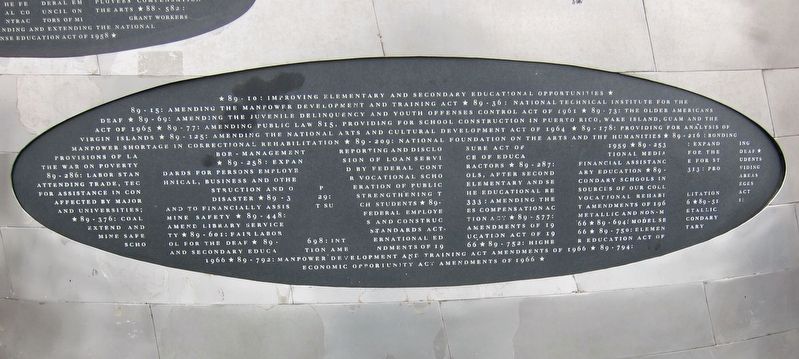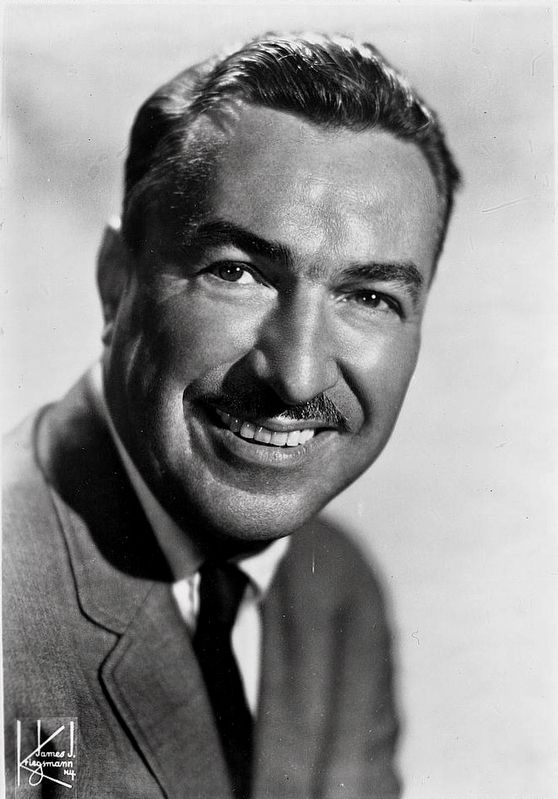Central Harlem in Manhattan in New York County, New York — The American Northeast (Mid-Atlantic)
Adam Clayton Powell, Jr.
1908 Born November 29, in New Haven, Connecticut.
1930 Received his BA from Colgate University, Hamilton, NY. Became assistant pastor at Harlem's Abyssinian Baptist Church.
1932 Received his MA in Religious Education from Columbia University, New York, NY. Became an instructor at Columbia University Extension School.
1933 Led a demonstration at New York's City Hall demanding more doctors and better health care at Harlem Hospital.
During the Depression Era, he directed relief operations that fed, clothed, and provided fuel for thousands of Harlem's needy. He also led a four year "Don't Buy Where You Can't Work" campaign which resulted in the employment of thousands of African Americans by utility and bus companies, retail stores, and the 1939 World's Fair.
1935 Wrote an article on the Harlem Riots that criticized police brutality and the discrimination of African Americans which led to a regular column in the Amsterdam News entitled "Soap Box".
1937 Appointed pastor to Harlem's Abyssinian Baptist Church.
1938 Received an honorary Doctorate of Divinity from Shaw University, Raleigh, NC.
1941 Elected to the New York City Council, he was its first African American member.
1942 Co-founded and published the People's Voice newspaper. Member of the National Negro Congress. Member of the Manhattan Civilian Defense.
1944 Elected to the U.S. House of Representatives; he was Harlem's first Member of Congress, and the first African American from the northeast to be elected to the House of Representatives. Elected thereafter to the eleven succeeding Congresses.
Once he reached Washington, D.C., he fought for an end to discriminatory practices around that city, and throughout the United States. Leading by example, he used segregated facilities, which he was not authorized to use, such as dining rooms, steam baths, and barbershops. In Congress he introduced legislation advocating the end of racial discrimination, including the first legislation to abolish Jim Crow laws in transportation, and the first bill to prohibit segregation in the Armed Forces.
He authored the Powell Amendment, which deprived federal funds to any institution that continued to practice racial discrimination. He tried to attach this amendment to any spending bill. A version of the amendment was codified in the Civil Rights Act of 1964.
1947 Received an honorary Doctorate of Divinity from Virginia Union University, Richmond, VA.
1955 Attended the first Asian-African Conference, Bandung, Indonesia. Appointed Chairman of the U.S. Congressional Delegation to the Independence
of the West Indies, Trinidad.
1960 Appointed Chairman of the House Committee on Education and Labor.
As Chair of the House Committee on Education and Labor, he directed the development and passage of over sixty pieces of legislation that established social programs, created jobs, and expanded educational and artistic opportunities.
1967 Excluded from his seat in the Ninetieth Congress. Elected to the Ninetieth Congress, by special election, to fill the vacancy caused by his exclusion, but he did not appear to be sworn in. Reelected to the Ninety-first Congress.
1969 Restored to his seat In Congress by the Supreme Court.
1970 Defeated by Charles Rangel for his seat in the Ninety-second Congress. Retired as pastor of the Abyssinian Baptist Church.
1972 Died April 4 In Miami, Florida.
(Monument board of directors and major contributors not transcribed, click on marker photograph to read them.)
Erected by Adam Clayton Powell Jr. Memorial Committee Inc.
Topics and series. This historical marker is listed in these topic lists: African Americans • Civil Rights. In addition, it is included in the Historically Black Colleges and Universities series list. A significant historical date for this entry is November 29, 1908.
Location. 40° 48.541′ N, 73° 56.878′ W. Marker is in Manhattan, New York, in New York County. It is in Central Harlem. Marker is at the intersection of Adam Clayton Powell Jr. Boulevard and West 125th Street, on the right when traveling north on Adam Clayton Powell Jr. Boulevard. Touch for map. Marker is at or near this postal address: 2101-2107 Adam Clayton Powell Jr Boulevard, New York NY 10027, United States of America. Touch for directions.
Other nearby markers. At least 8 other markers are within walking distance of this marker. Langston Hughes Playground (approx. ¼ mile away); The First Vest-Pocket Park (approx. ¼ mile away); Swing Low: Harriet Tubman Memorial (approx. ¼ mile away); Romare H. Bearden (approx. 0.3 miles away); Scott Joplin (approx. 0.3 miles away); Zora Neale Hurston (approx. 0.3 miles away); Roosevelt Triangle (approx. 0.4 miles away); Morningside Park (approx. 0.4 miles away). Touch for a list and map of all markers in Manhattan.
Also see . . .
1. POWELL, Adam Clayton, Jr. (US House of Representatives). "An unapologetic activist, Adam Clayton Powell, Jr., left his mark on Congress during his 12 terms in the House of Representatives. Viewed by his Harlem constituents as a dedicated crusader for civil rights, Powell earned the loyalty and respect of many African Americans with his confrontational approach to racial discrimination. Never one to shun the spotlight, the outspoken
New York minister and politician—regarded as an irritant by many of his congressional colleagues—relished his position as a spokesperson for the advancement of African–American rights. Although Powell fought tirelessly on behalf of minorities, his legal problems and unpredictable behavior eventually undermined his influential but controversial political career. “Keep the faith, baby; spread it gently and walk together, children,” was a legendary slogan of the charismatic and flamboyant Representative." (Submitted on January 8, 2018.)
2. Powell, Adam Clayton, Jr. (1908-1972) (BlackPast.org). (Submitted on January 8, 2018.)
3. Adam Clayton Powell Jr. (Wikipedia). "Adam Clayton Powell Jr. (November 29, 1908 – April 4, 1972) was a Baptist pastor and an American politician, who represented Harlem, New York City, in the United States House of Representatives (1945–71). He was the first person of African-American descent to be elected from New York to Congress. Oscar Stanton De Priest of Illinois was the first black person to be elected to Congress in the 20th century; Powell was the fourth....Re-elected for nearly three decades, Powell became a powerful national politician of the Democratic Party, and served as a national spokesman on civil rights and social issues. He also urged United States
presidents to support emerging nations in Africa and Asia as they gained independence after colonialism....In 1961, after 16 years in the House, Powell became chairman of the Education and Labor Committee, the most powerful position held by an African American in Congress. As Chairman, he supported the passage of important social and civil rights legislation under presidents John F. Kennedy and Lyndon B. Johnson. Following allegations of corruption, in 1967 Powell was excluded from his seat by Democratic Representatives-elect of the 90th Congress, but he was re-elected and regained the seat in the 1969 United States Supreme Court ruling in Powell v. McCormack. He lost his seat in 1970 to Charles Rangel and retired from electoral politics." (Submitted on January 8, 2018.)
Credits. This page was last revised on January 31, 2023. It was originally submitted on January 8, 2018, by Andrew Ruppenstein of Lamorinda, California. This page has been viewed 422 times since then and 19 times this year. Photos: 1, 2, 3, 4, 5. submitted on January 8, 2018, by Andrew Ruppenstein of Lamorinda, California.
